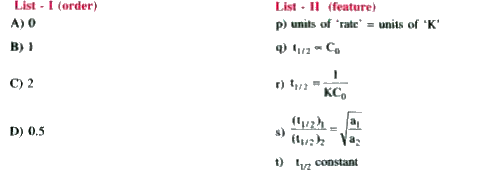50% of a reaction is completed in 20 minute and 75% is completed in 30 minutes from the beginning, What is the order of reaction?Solution in Telugu
The correct Answer is:0
t12α1an−1,(t12)1(t12)2=(a2a1)n−1,2010=(50100)n−1,21=(12)n−1,(21)1=(21)1−n1=1−n,n=1−1,n=0
Topper's Solved these Questions
- CHEMICAL KINETICSBOOK - AAKASH SERIESCHAPTER - CHEMICAL KINETICSEXERCISE - PRACTICE SHEET-1 (SINGLE OR MORE THAN ONE OPTION QUESTIONS)
16 Videos
- CHEMICAL KINETICSBOOK - AAKASH SERIESCHAPTER - CHEMICAL KINETICSEXERCISE - PRACTICE SHEET-1 (LINKED COMPREHENSION TYPE QUESTIONS)
6 Videos
- CHEMICAL KINETICSBOOK - AAKASH SERIESCHAPTER - CHEMICAL KINETICSEXERCISE - LEVEL-II(LECTURE SHEET EXERCISE-III MATCH THE FOLLOWING QUESTIONS)
3 Videos
- CHEMICAL KINETCSBOOK - AAKASH SERIESCHAPTER - CHEMICAL KINETCSEXERCISE - EXERCISE - 3.2
45 Videos
- CHEMICAL THERMODYNAMICSBOOK - AAKASH SERIESCHAPTER - CHEMICAL THERMODYNAMICSEXERCISE - Additional Practice Exercise
54 Videos
Similar Questions
For the reaction N2+3H2→2NH3 , the rate d[NH3]dt=2×10−4Ms−1. Therfore the rate −d[N2]dt is given
View SolutionThe instantaneous rate of an elementary chamical reactkon aA+bB⇔cC+dD can be given by rate =Kf[A]a[B]b−Kb[C]c[D]d where Kf and Kb are rate constants for forward and backward reactions respectively for the reversible reaction. If the reaction is an irreversible one, the rate is expressed as, rate =K[A]a[B]b where K is rate contant for the given irreversible rate of disappearance of A is a/b times the rate of disappearance of B. The variation of rate constant K with temperature is expressed in terms of Arrhenius equation: K=Ae−Ea/RT whereas the ratio KfKb is expressed in terms of van't Hoff isochore: KfKb=Ae−ΔH/RT, where Ea and ΔH are energy of activation and heat of reaction respectively.
The variation of rate constant K and KfKb with temperature shows the following effects:
For endothrmic reaction when T increases then K increases and KfKb also increases.
(ii) For endothemic reaction when T decreases then K decreases and KfKb also decreases.
(iii) For exothermic when T increases then K and KfKb both increases.
(iv) For exothermic reaction when T decreases then K increases and KfKb decrease.
(v) For exothermic reaction when T increases thenK and KfKb both decrease.
View SolutionMatch the following columns

View SolutionDiscuss on the kinetic spontaneity of a chemical reaction. Is a slow reaction spontaneous? Why?
View SolutionWhich among the following is not an exact differential?
View Solution75% of the first order reaction was completed in 32 minutes. When was 50% of the reaction completed
View Solution75 % of first order reaction is complete in 30 minutes. What is the time required for 93.75 % of the reaction (in minutes) ?
View Solutionएक प्रथम कोटि की अभिक्रिया 32 मिनट में 75% पूर्ण होती है, 50% पूर्ण होने में लगा होगा-
View Solution75% of a first order reaction is completed in 32 minutes. 50% of the reaction would have been completed in
View SolutionFor a first order reaction, it takes 16 min to complete 50% reaction. How much time does it take to complete 75% reaction?
View Solution75% of a first order reaction was completed in 32 minutes, 50% of the reaction will be completed in
View SolutionFor the first order reaction, it takes 16 minutes to complete 50% reaction .How much times will it take to complete 75% reaction?
View Solution75% of a first order reaction was found to complete in 32 minute. When will 50% of the same reaction complete:
View Solution75% of a first order reaction was completed in 32 minutes. When was 50% of the reaction completed ?
View Solution75% of a first order reaction is completed in 30 min. What ts the time required for 93.75% completion of the reaction (in minutes) ?
View Solution
